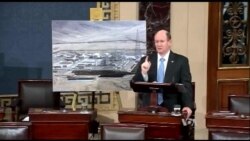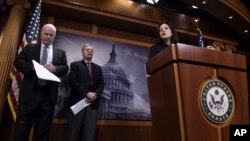While politically minded Americans focus on Iowa’s presidential caucuses, many of their representatives in Congress continue to speak out on the international nuclear accord with Iran. The pact remains a lightning rod for controversy on Capitol Hill, where sharp differences persist on its merits, limitations, and impact on the Middle East and beyond.
Months after the Joint Comprehensive Plan of Action (JCPOA) was signed, and weeks after its implementation began, lawmakers have lost none of their passion for or against the deal.
“Iran shipped more than 12 tons of low enriched uranium to Russia, where the fuel is stored in a facility that is guarded by the IAEA,” noted Senator Jeanne Shaheen, one of five Democrats who took to the floor late last week to speak out on the JCPOA.
Another Democrat, Senator Chris Coons, used an enlarged photo of Iran’s Arak nuclear facility as a prop during his remarks.
“The International Atomic Energy Agency certified to the world that Iran had taken the very core of this reactor, capable of producing weapons-grade plutonium, and filled it with concrete,” Coons said.
The comments reflect cautious optimism from backers of the nuclear deal as Iran gains access to frozen assets and international capital for having adhered to the pact’s initial stipulations.
Opponents blast Tehran’s ‘windfall’
But critics see a newly empowered Iran flush with cash to spend in the region.
“It’s a course of events that only furthers Iran’s continued violation of U.N. resolutions, its continued support for terrorism, and its continued seeking of regional domination,” said Republican Senator Kelly Ayotte at a recent news conference.
“You might as well have written the check to (Bashar al-) Assad yourself,” said Republican Senator Lindsey Graham, speaking of Iran’s financial windfall. “You might as well have funded Hezbollah yourself. So all of this cash going into the ayatollah’s pockets won’t stay long. It’s not going into roads and bridges in Iran. It’s going into war machines throughout the Mideast.”
On one point, critics and backers of the deal agree: vigilance on Iran must continue. Supporters argue the pact facilitates that scrutiny and will help the United States avoid mistakes of the past.
“I certainly pray that we will never again send American men and women into war based on false intelligence,” said Democrat Tim Kaine, referring to the 2003 U.S. invasion of Iraq. “And the only way we can guard against that eventuality is to have stronger intelligence. The IAEA inspections will give us better intelligence.”
There is also bipartisan agreement on the need to reauthorize expiring U.S. sanctions on Iran that could be swiftly reimposed if Tehran violates the nuclear accord.














